REPOST NEWSWEEK Michael Edison Hayden On 2/13/18 at 12:16 PM
http://www.newsweek.com/nebraska-white-supremacist-unique-challenges-campus-free-speech-804442
The University of Nebraska-Lincoln (UNL) receives messages and phones calls about Daniel Kleve all the time these days. The 23-year-old undergraduate biochemistry major is a white supremacist who is overtly racist and dangerous, his classmates say. They don’t want to share classes with him, they don’t want to bump into him in a dining hall—they don’t want to see the tawny-haired man on campus ever again.
Antifascist Action Nebraska, a local group that has developed a national reputation among activists for the relentlessness with which it tracks the movements of white supremacists, published a video of Kleve speaking with other extremists on Google Hangout, and it went viral last week, further inflaming the sense of outrage about him.
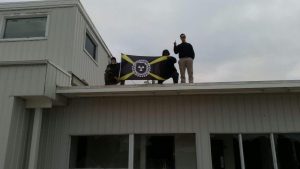
“Just because I dress like a normie—a regular person—doesn’t mean I don’t love violence,” Kleve said to a group of peers regarding his ambitions as a white supremacist. “Trust me. I want to be violent. Trust me. Really violent.”
Kleve, who is fond of posting selfies with guns to social media, also said that “now is not the right time” for violence, and he has argued that the edited video took his words out of context—but the language spoke for itself to students who were already concerned about him and his demonstrable connections to neo-Nazi groups. Hundreds of students demanding Kleve’s expulsion gathered on campus grounds to stage a protest on Wednesday of last week, adding a physical presence to what was already a sustained campaign of activism.
The question about what to do with the increasingly isolated Kleve is emblematic of a larger issue facing colleges across the country. Even though the era of so-called alt-right politics that arose during the populist campaign of Donald Trump has shown signs of fracturing, it has emboldened a small but not insignificant number of young, white men to come forward with white supremacist or neo-Nazi beliefs. As this is happening, women, minorities and other communities that are threatened by the political goals of such men are becoming more sensitive to their presence, and demanding that schools take action to protect them. Young white supremacists were tied to a number of murders last year, further complicating the issue. The situation is a complex one, and it poses challenges to both administrators and to advocates of free speech.
Samantha Harris, a researcher with Foundation for Individual Rights in Education (FIRE), told Newsweek that the question of whether to expel an extremist like Kleve is typically drawn along one line: All political beliefs should be tolerated in academia, but “actual harassment is not protected speech.” By “actual harassment,” Harris said she meant anything that prohibits someone from receiving a normal education.
In the case of Kleve, the university told Newsweek it was not clear he had made any threats against a specific student or students. But his classmates have told Newsweek that Kleve made them feel uneasy because they believed him to be capable of unleashing violence at any time. Additionally, Calvin Scott, 19, Kleve’s former roommate at an off-campus housing facility, and Scott’s friend, Jackie Schneider, 20, told Newsweek that Kleve made violent threats against people of color—generally and also about specific individuals. Both Scott and Schneider are people of color themselves, but neither of them are UNL students. Kleve has denied making such threats. UNL campus police told Newsweek that Kleve currently represented an active investigation, but declined to elaborate any further about what it entailed.
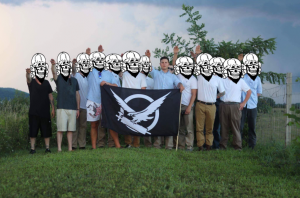
The issue is tricky for UNL to navigate for reasons beyond the obvious. Politicians in the Republican-dominated state have been fiercely critical of the school for what they perceive to be its mistreatment of conservatives. The state is currently reviewing a bill surrounding campus free speech, for example, one of several similar measures being examined throughout the country. The Nebraska measure, Legislative Bill 718, introduced by state Senator Steve Halloran of Hastings, would force schools like UNL to create a “Committee on Free Expression” to provide an annual incident report to state residents about free speech matters. Critics say the bill, which was issued in response to a graduate student and lecturer who gave the finger to a student who was recruiting for a conservative group, is intended to amplify only voices of Republican students on campus. In response to the incident, UNL will not renew a contract to teach issued to the graduate student who made the gesture.
In addition to this, the University of Nebraska Board of Regents has adopted its own policies to delineate areas where certain kinds of speech are permissible on campus. “When people want to censor viewpoints that people don’t like, universities have to step in and protect free speech,” Harris of FIRE argued to Newsweek, referring to both right- and left-leaning viewpoints. FIRE has defended not only conservative viewpoints on campus, but wrote a letter criticizing UNL for the way it treated the graduate student and lecturer caught up in the scandal.
Adding to UNL’s headache with Kleve is that Nebraska is a racially homogenous state. It’s nearly 90% white, according to census data. UNL said it has worked to strengthen diversity on campus, and boasted an enrollment of 3,173 minority undergraduate students in 2017, or 15.1 percent of the undergraduate total. It might not seem like very much compared to other state schools in the country, but it represents the most diverse student body in the university’s 149-year history. The growing scandal surrounding Kleve—who called himself “the most active white nationalist in the Nebraska area”—not only undercuts those gains in recruitment, but potentially puts existing minority students at risk of danger, according to critics.
“Trust me. Really violent.”
The students who claim Kleve is a danger to others argue that the school should be looking at his history to understand their concerns. He appeared in Charlottesville, Virginia on August 12 in a contingent with Vanguard America, the white supremacist group whose followers included James Fields, the man charged with murdering antiracist activist Heather Heyer in a brutal car-ramming incident. He also posted photos of himself next to an Atomwaffen flag in 2017. Atomwaffen is a neo-Nazi group that has garnered headlines for being linked to a number of murders. Kleve told me he has “publicly disavowed” Atomwaffen, and no longer belongs to any white supremacist groups, but as recently as this year, he was posting white supremacist slogans on Facebook, and endorsing “the Order,” a fictional collective depicted in the neo-Nazi propaganda book The Turner Diaries.
In the book, “the Order” slaughtered Jews, non-whites and other minorities in part of a make-believe race war. The book was admired by terrorists like Oklahoma City bomber Timothy McVeigh and David Copeland, a British man who murdered three people in a bombing campaign that was targeted at minorities in 1999. Keegan Hankes, an intelligence analyst with Southern Poverty Law Center, told Newsweek that people “should be concerned” about violence when dealing with those who associate with Vanguard America and Atomwaffen, even peripherally.
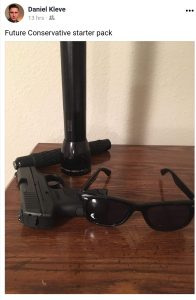
“Everyone has to remember that this ideology is founded on building a white ethnostate,” Hankes said. “They believe that they are fighting for the survival of the white race.”
Scott, who lived with Kleve from mid-October to the start of December 2017, told Newsweek that Kleve had an AR-15 assault rifle that he kept in a common area of their apartment. Schneider, Scott’s friend, said she saw the weapon as well but thought it was a shotgun. (She admitted to not knowing much about firearms, while Scott claimed to have a better understanding of them.) Scott also told Newsweek that Kleve kept a pistol “on him.” Nebraska is an open-carry state, and Lincoln Police confirmed to Newsweek that Kleve would be legally allowed to carry a weapon outside of campus. Kleve told Newsweek that his guns were purchased legally but would not elaborate on how many he owns, or their makes and models. He denied owning an AR-15, but declined to answer whether he owned any similar weapons that could be mistaken for one.
Scott said he didn’t report to the police about threats Kleve made because he didn’t trust them to do their job, but he reported his roommate to the housing complex, asking for a separation. A report issued by the administration of their housing complex and given to Newsweek confirmed that Scott had expressed “concerns” about his roommate at the time he lived with Kleve. Their relationship ended when Kleve moved out. Kleve claimed Scott was making up stories about him.
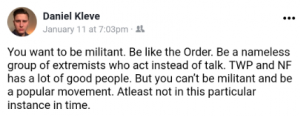
“Nothing has changed,” Leslie Reed, a spokesperson for the school, told Newsweek while students were protesting Kleve’s presence, regarding their hesitancy to remove him from UNL.
The University of Nebraska can’t “discriminate against someone for having unpopular political beliefs,” she said previously.
“I can’t wait to graduate so that I can get out of everyone’s hair”
Students who spoke to Newsweek about Kleve, who frequently boasts about what he believes to be his talents as a propagandist, suggested that his tactics are having the opposite of their intended impact. Kleve is not only failing to make recruiting in-roads for his cause, the students claimed, but his views have made him into a pariah on campus. On Saturday, for example, the Nebraska’s men’s basketball team waged a protest against his presence before their game with Rutgers. The men wore T-shirts that read, “Hate Will Never Win.” Student athletes across campus, in fact, have used their influence to condemn Kleve, and a search for his name on Twitter will turn up what looks like a deluge of disgust from fellow classmates.
Harris of FIRE argued to Newsweek that condemnation and debate is the best way to deal with a student like Kleve, so long as he was not harassing or endangering specific students. “The best way to combat [white supremacist advocacy] is with more speech and better ideas.” But because of Kleve’s apparent racist fixation with violence, he potentially represents a different case than other “alt-right” figures who have stirred protest on campuses.
One similar case to Kleve’s is that of Mark Daniel Neuhoff, a 27-year-old graduate student in Virginia Tech’s English department. Neuhoff’s presence on campus sparked a massive outcry in the fall semester of 2017. Posts from Neuhoff’s Facebook account that appeared to endorse white supremacy, Hitler and the Nazi application of “Jewish stars” during World War II were leaked by a local antifascist group. Students were outraged when they saw them, and their feelings were complicated by the fact that Neuhoff taught undergraduates in his capacity as a teacher’s assistant.
Virginia Tech told Newsweek that following relentless protests and phone calls, the administration and Neuhoff came to a quiet agreement that he would no longer teach there. Since that time, Neuhoff has become an outcast. He said he was grateful for the way the administration handled his case, but expressed feelings of despair and loneliness in describing his time in school there. He suggested that colleagues had ostracized him and severed all ties.
He told Newsweek that he was actually a “paleoconservative monarchist” and not a white supremacist, despite his posts appearing to praise Hitler, and claimed that his views were taken out of context. He also complained that the posts that appeared to many students to be deeply anti-Semitic were made on a locked feed, and that antifascist activists had infiltrated his account.
“It’s made me feel extremely unwelcome and I can’t wait to graduate so that I can get out of everyone’s hair and they can get out of mine,” he told Newsweek about the atmosphere of his education.
While Neuhoff longs to make an exit from academia, others on the far-right are eager to make inroads there, but so far with extremely limited success. Matthew Heimbach of Traditionalist Worker’s Party (TWP), a small but active neo-Nazi group, is attempting to start a college speaking tour called “National Socialism or Death” at the University of Tennessee in Knoxville later this month. He told Newsweek that the point of the exercise is to find common ground with “conservatives and socialists.” As with rallies staged by white supremacist Richard Spencer, though, protesters of the event are expected to outnumber his supporters. Heimbach argued that he was doing it to argue for a “safe space for fascists” in academia, but it is also unclear that fascist beliefs are really treated with any intolerance by administrators. Students like Neuhoff and Kleve are isolated, but they are also enrolled.
White supremacist speaking events come at a time when the movement is aggressively papering propaganda across American colleges. The Anti-Defamation League has documented 346 incidents of white supremacist propaganda appearing on campuses since the start of the 2016 school year, including “fliers, stickers, banners, and posters.” The incidents span 216 campuses across 44 states. Andrew Oswalt, a graduate student at Oregon State University, drew headlines for being arrested last month for a July 2017 incident in which he and other white men allegedly placed racist bumper stickers on the backs of cars, but those who monitor the far right argue that he may be an exception to the rule. Most white supremacists who target campuses do so because they feel excluded from campus life, and dismissed by intellectuals generally speaking, rather than the other way around.
The far right is a busy but ultimately small online community, at least when it comes to people who don’t operate anonymously. Neuhoff is Facebook friends with Kleve and interacts with him from time to time. He said that while Kleve is more involved with “what people call white nationalism, national socialism, and the pro-white cause in general,” he identifies with Kleve because of the degree to which they’ve been alienated from their peers in a left-leaning environment.
“Our cases are the same,” Neuhoff argued to Newsweek about Kleve. “We have views other people don’t like and they’re taking things out of context or using any possible tactic to cause us harm while trying to convince people we are violent.”
But two substantial differences exist between the complaints about Kleve and Neuhoff. Neuhoff told Newsweek that he never belonged to a white supremacist or neo-Nazi group. During the violence at the Unite the Right rally in Charlottesville that Saturday afternoon in August, for example, he said that he was in church. (Neuhoff is in the process of converting to Christian Orthodox after having grown up in a non-religious household.) Also, he said he doesn’t own any guns.
“The student’s viewpoint — however hateful and intolerant it is — is also protected by the First Amendment.”
Justin Myers, 18, a freshman business student at UNL and a self-described conservative, told Newsweek that while he wasn’t sure if Kleve had done enough to be “legally kicked off campus” in terms of his praise of violence, he would feel uncomfortable being anywhere near him in class.
Myers also argued that there was a difference between the campus debates about free speech between conservatives and leftists, and the threat of overt neo-Nazism. “These guys hate our system of government and the freedoms we have,” Myers said.
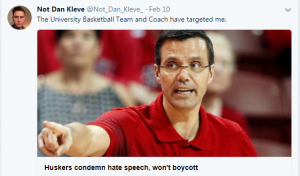
But for the school’s administration, Kleve is being treated like any other student.
“I have heard from many of you in our community and beyond, calling for this student to be removed from campus based on concern for safety and outright disgust and rejection of the ideologies represented,” school Chancellor Ronnie Green wrote, acknowledging that he himself “categorically rejects” such viewpoints. “The student’s viewpoint — however hateful and intolerant it is — is also protected by the First Amendment.”
Kleve, for his part, changed his tone dramatically when speaking to Newsweek via text message as the controversy on campus unfolded last week. Initially, Kleve came across as dismissive, mocking journalism, but as time went on and the controversy over his captured remarks about violence grew, his tone both to Newsweek and on social media evolved into something much more personal and anxious. He said that he valued his education, and looked forward to becoming a doctor.
“I have never claimed to be perfect,” Kleve wrote on Facebook while criticizing a local news article that mentioned him being arrested at the age of 17 for possession of marijuana. “I lived in different foster homes from the moment of my birth and grew up in a degenerate environment.”
As he posted those remarks, the anger about him only seemed to grow online.
“EXPEL DAN KLEVE,” a woman wrote on Twitter late Thursday morning after the school had posted its explanation for not taking action. “Get rid of Dan Kleve,” another female student pleaded a few hours later on the site. Fifteen minutes after that, a male student piped in: “Kleve is in violation of the student code of conduct. He should be removed for the safety of all.”
Kleve finally acknowledged on his Twitter account on Monday what he would not tell Newsweek in multiple conversations over text message: The sustained campaign to expel him, the local news reports on his situation and the silent treatment he had received from other classmates had driven him to the point of despair.
“I feel exactly how my enemy wants me to feel,” Kleve wrote in the context of saying that he would not give up his politics. “Alone, powerless, and void of any hope for the future.”
